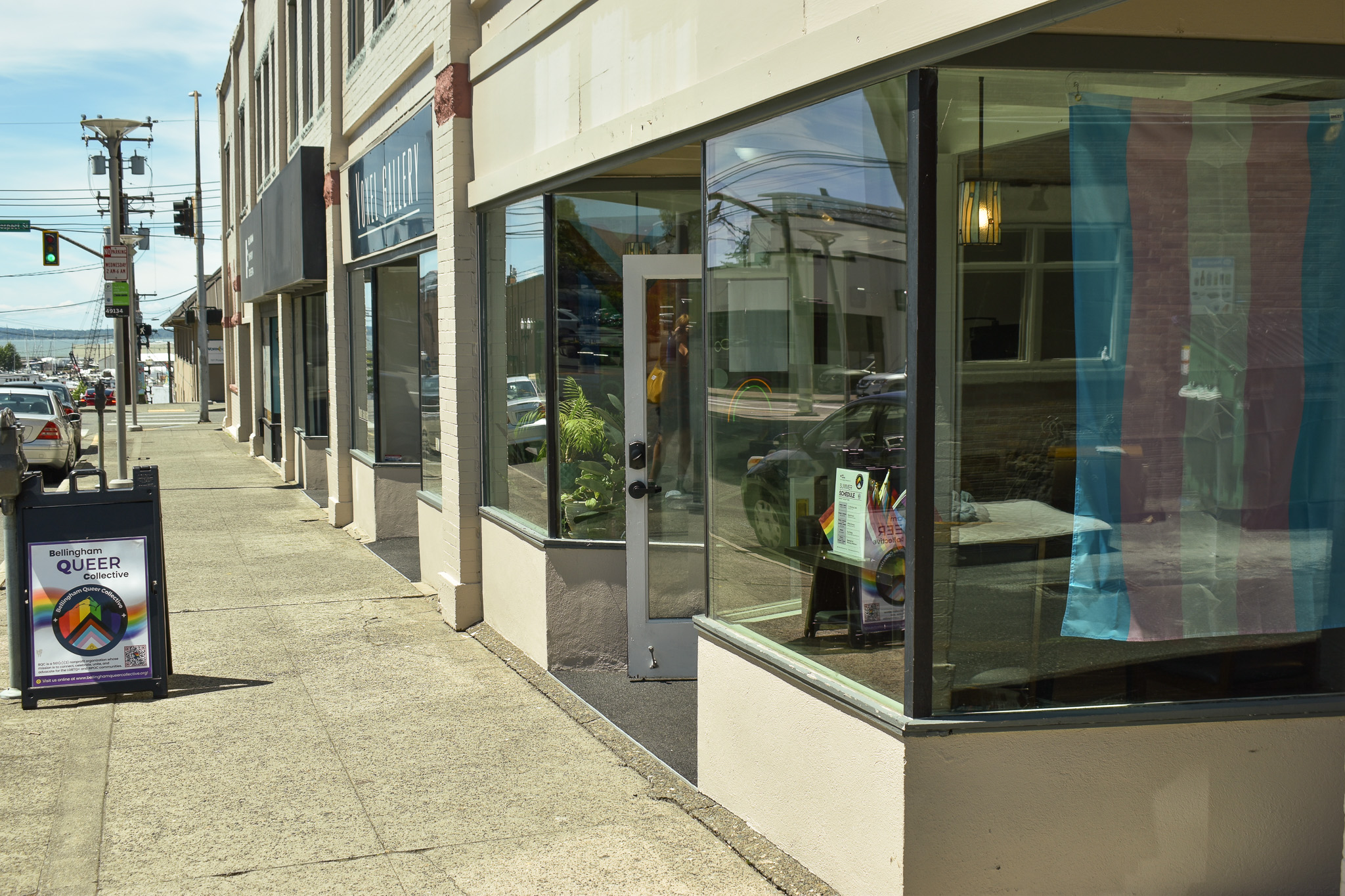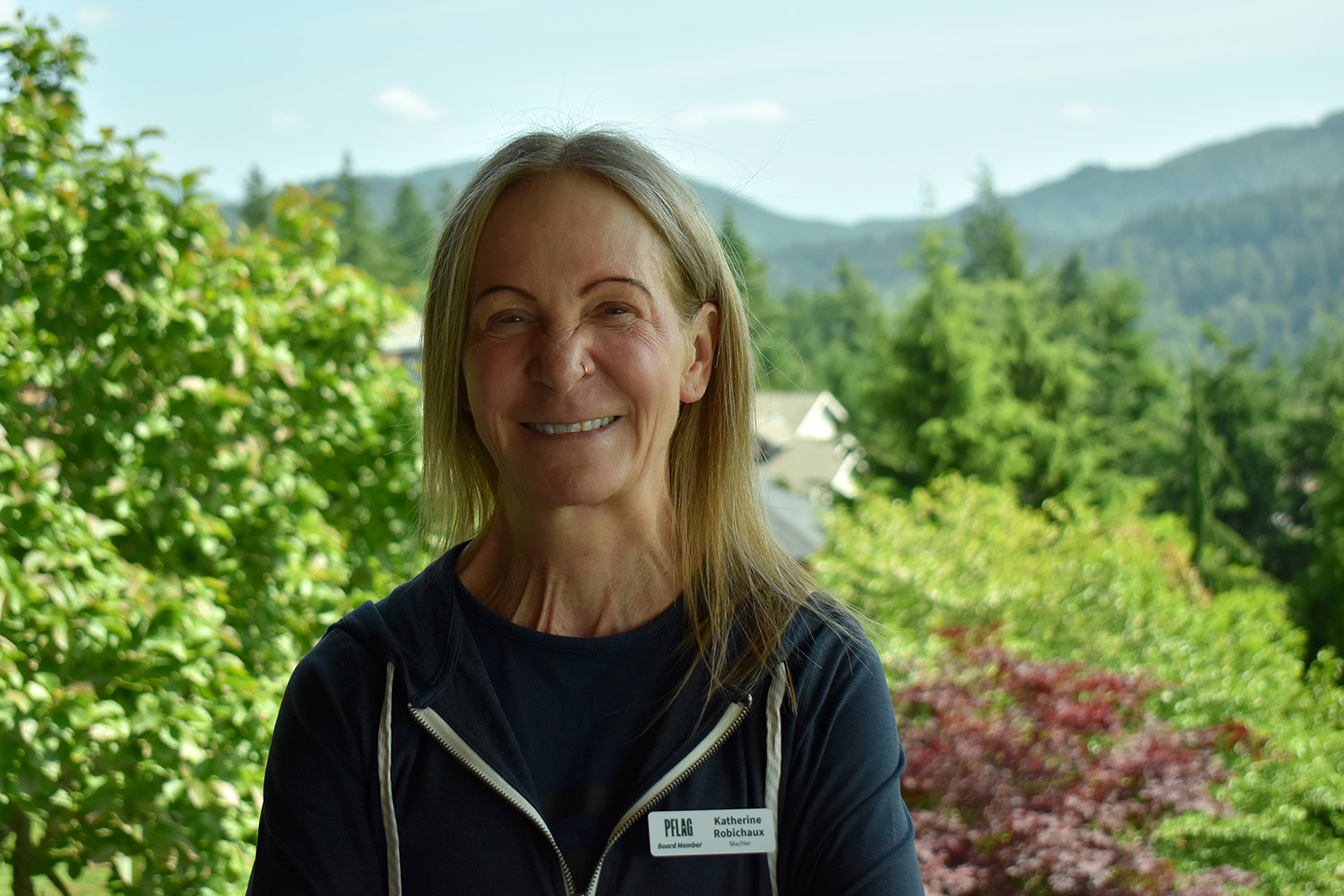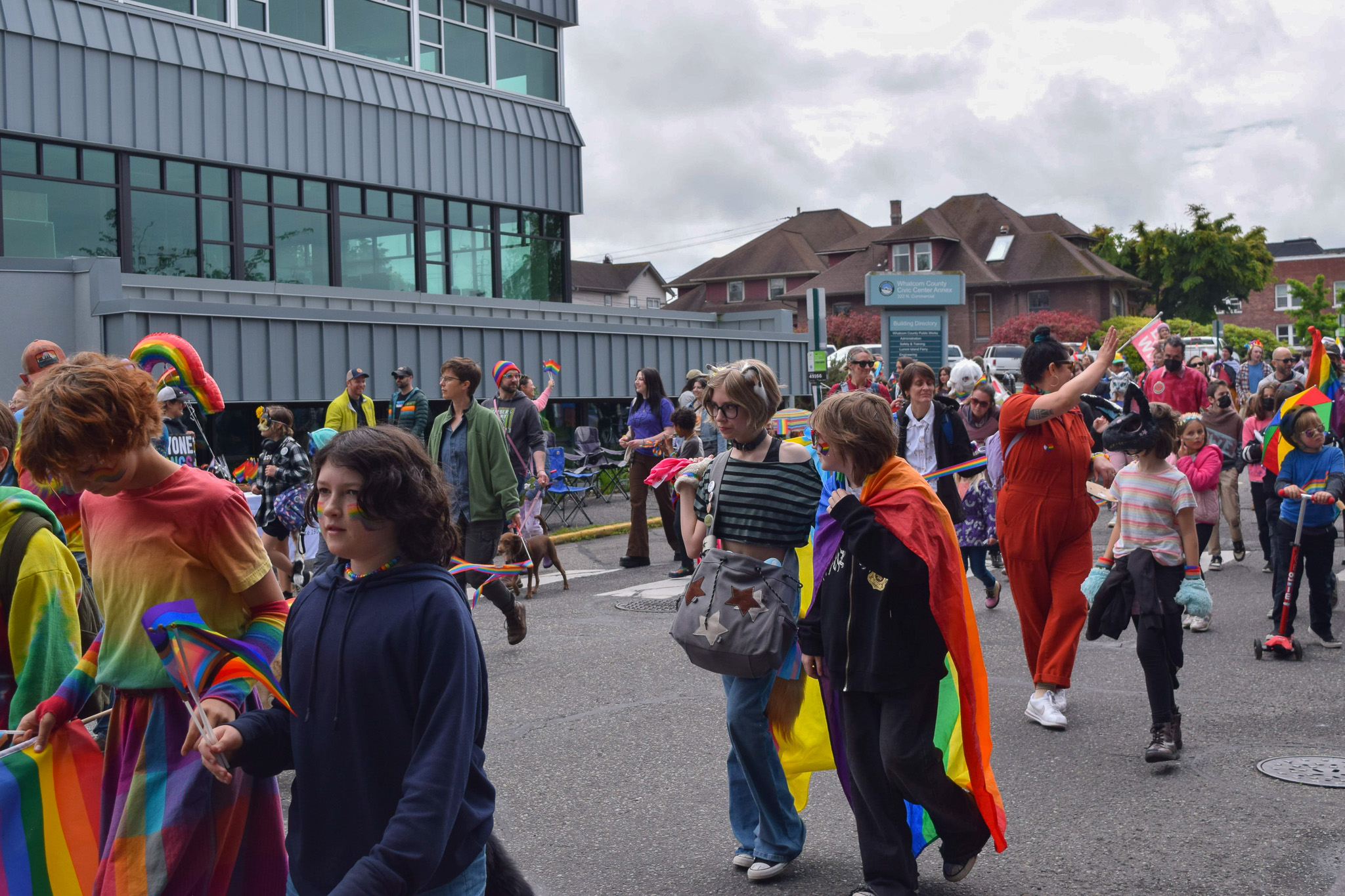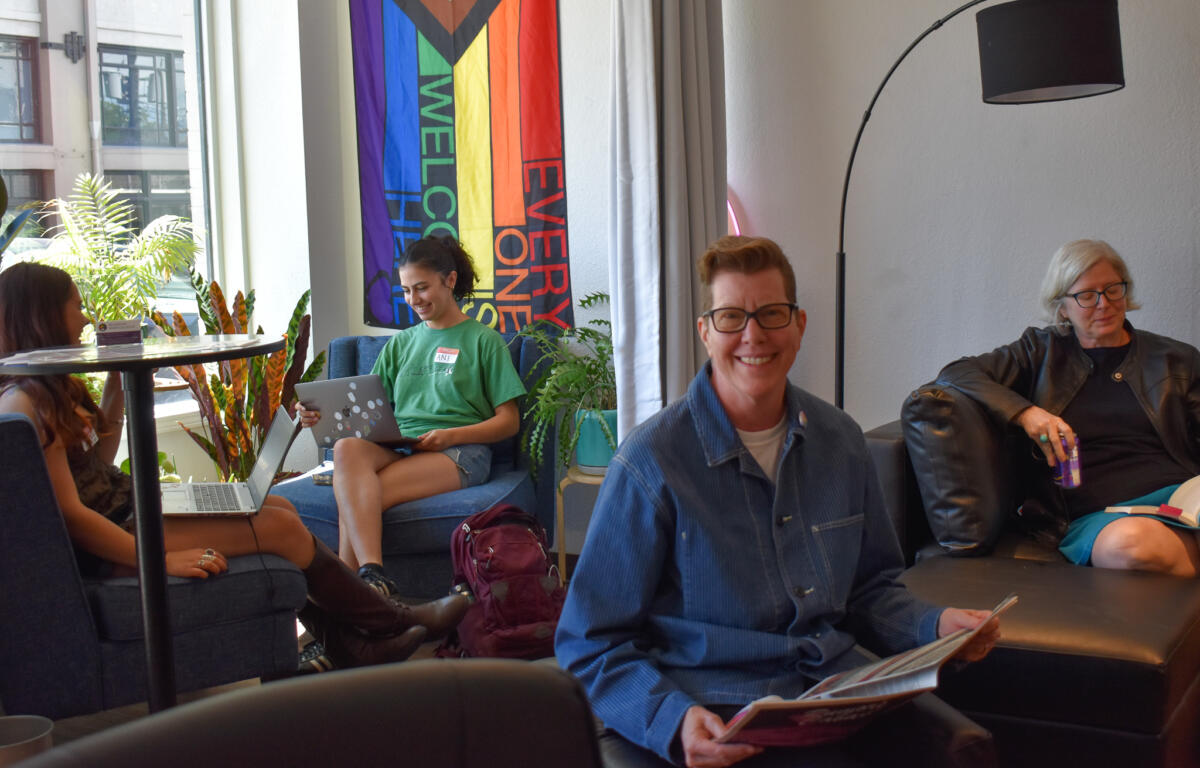WHATCOM COUNTY, WA (MyBellinghamNow.com) – Visibility of queer people in the United States has increased in the last few decades. Finding community in an ever-changing landscape can be difficult despite this visibility, which has brought some changes to Whatcom County in the last few years.
The Bellingham Queer Collective (BQC) was created when Michelle Harmeier moved with their partner to Bellingham during the COVID-19 pandemic. They were looking for a way to connect with their new community as elders that are not likely to go to Rumors Cabaret, Bellingham’s gay club.
“I moved here because I knew there was a large queer community. I knew that by visiting since 2017 it was a very welcoming city,” Harmeier said.
“What we’re doing is just adding an option for people to find ways to gather, to socialize if they’re not already plugged in somewhere else as queer people,” Harmeier said. “If you’re not belonging to a church or a school community and aren’t able to interact with people openly at work, which a lot of queer people are not able to do, then how do you find community?”

Harmeier described to My Bellingham Now how their organization, though new, fits into an apparatus designed to support queer people in Whatcom County. The BQC supports adults in the region while Whatcom Youth Pride supports young adults, and the Senior Activity Center’s Rainbow Elders group provides community connections to older adults. LGBTQ+ Western is a department at Western Washington University that provides resources to university students.
The fifth prong according to Harmeier is the local chapter of PFLAG. Originally meaning Parents and Friends of Lesbians And Gays, the group now just operates under the acronym and provides support to allies of the LGBTQ+ community. Our region has had a chapter for at least 30 years according to board member Katherine Robichaux.
“What’s nice about PFLAG is, for example, our board is mixed. We have cisgender people, we have nonbinary people, we have queer people, we have trans people and we come around together around three pillars,” Robichaux said. “We do support, we do education and we do advocacy.”
PFLAG holds a support meeting on Mondays in downtown Bellingham with occasional speakers scheduled. According to Robichaux, PFLAG and BQC operate in the same spaces when it comes to group meetings. BQC has affinity groups centered around different identities and themes to provide what Harmeier describes as a club.
“We’re not there as therapists, we’re there as a caring group of people who want to have a safe space for people to come and talk about what is on their mind,” Robichaux said.
PFLAG educates the public about how to be better allies as well, often going to businesses with queer employees to talk about how to support their staff. When it comes to advocacy, PFLAG takes on knowledge from a variety of sources.
“We just brought on a couple of new board members, including a legislative watchdog — person who’s a lawyer — to help us keep our eye on what’s going on in the state as well as what’s happening nationally,” Robichaux said.
She added something unique the northwest Washington’s chapters of PFLAG is the Transgender Assistance Fund. Skagit’s chapter has pooled resources with Whatcom to provide money for trans people needing new clothes or assistance in changing their name among other things.
“People shouldn’t be afraid to ask us for help. We might not find it within our three pillars [that] we do support, but we’ll try to connect them to someone who can help, and that, I think, is allyship right there,” Robichaux said. “We have commitment and passion to this community, to the queer community, and we’ll do what we can to continue connecting and building community.”

The BQC will take on some of what PFLAG cannot. The organization is in a growing stage, renting a new space in downtown Bellingham to provide an effective “third place” for people in the queer community.
Harmeier hopes to expand their partnerships in the coming months to encompass more of the community. They say their fundraiser period happens from the beginning of June to end of July, accounting for Pride month and the festivities in throughout Whatcom County in mid-July.
Bellingham’s Pride festival is occurring from Friday, July 11 through Sunday, July 13. Included in the festival are a books and beer-centric event, the family picnic at Boundary Bay and an all-ages dance party. It culminates in the Pride Parade in downtown Sunday with a Pride Festival that afternoon.
The all-ages dance party on Saturday afternoon occurs at the HUT, a new space opening under Rumors Cabaret. The HUT is designed to be an alcohol-free space for those ages 18 to 24 can gather and dance in a judgment-free environment. According to Harmeier, it is named after one of the first gay bars to operate in Bellingham.
Volunteer coordinator for Pride In Bellingham Daija Heyward said in a statement that Pride is about queer joy.
“Pride in Bellingham is absolutely magical. It’s this beautiful, tangible celebration of queer joy that really speaks to the heart of our community. What makes it so special here is that it’s a space where every generation, every identity, and every person can come together in full celebration,” they said.
Harmeier and Heyward both noted that being out-and-proud is as not as easy in the current political climate. But neither said they would shy away from expressing their identity or supporting other in being their true selves.
“Celebrating Pride today means not only honoring those who came before us, but also committing to ongoing activism, making sure that our future generations can live in a world where they can love and be loved without fear. It’s about building a culture of inclusivity and solidarity, where queer people are free to express themselves and be celebrated in all their fullness. And, of course, it’s about enjoying our lives, loudly and proudly, as an act of defiance against a world that often tells us to be quiet,” Heyward added in their statement.

Ferndale will be holding their first pride weekend on Saturday, July 19 and Sunday, July 20. When asked why now, organizer Sara O’Connor with Connect Ferndale said simply that it was about time.
“[Connect Ferndale] met at the beginning of the year to plan out the activities that we wanted to do for the whole year. And everybody agreed in January we have to do Pride this year,” O’Connor said. “I feel like I’ve had conversations for the last four or five years with different people in Ferndale, where there’s a desire and people want to see it, but there isn’t anybody [to] champion it, and so Connect Ferndale just as a group decided ‘This is our year, we got to do it,’ so we made it happen.”
Ferndale’s weekend will be as much about visibility and validation for queer people as it will be about education for people in the larger community. They will hold workshops to talk about queer identity and other things in different locations in the city.
“I don’t want to speak for the LGBTQ community, but I definitely feel like there’s knowledge gaps. I think that’s why part of our event is really about filling in those knowledge gaps,” she said. “We want to bring information about topics like gender and transgender youth, because I think that there’s just information that people don’t have.”
O’Connor said there are worries that they may have some backlash within the community for putting on this event. But she isn’t going to shy away from that either.
“I just really like if there’s one youth, if there’s one kid, one person in my community, who feels negatively about themselves because they are thinking about or questioning themselves, or just somebody who’s discovering who they are, and they’re feeling negative about that because of things they hear in the community, if they see a flag or a sticker or some symbol like that, and feel just even for a minute, there’s somebody that cares about me and that somebody that validates my existence for who I am, that I think that’s the most important thing,” she said.



